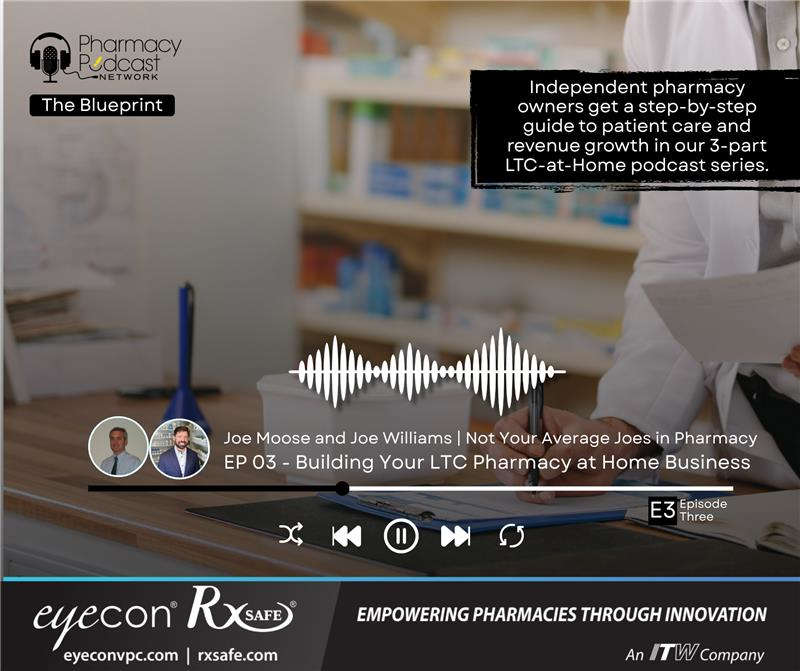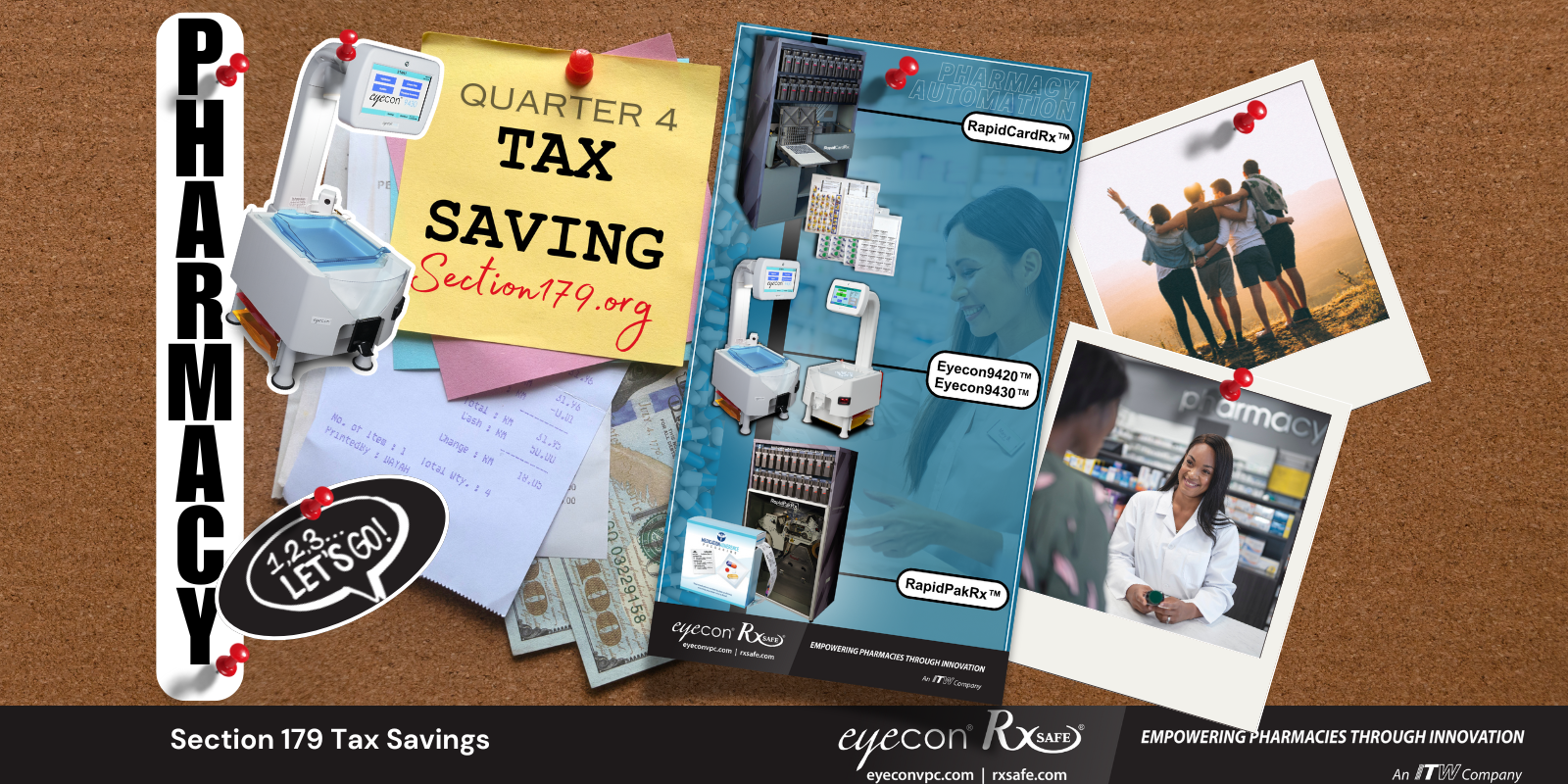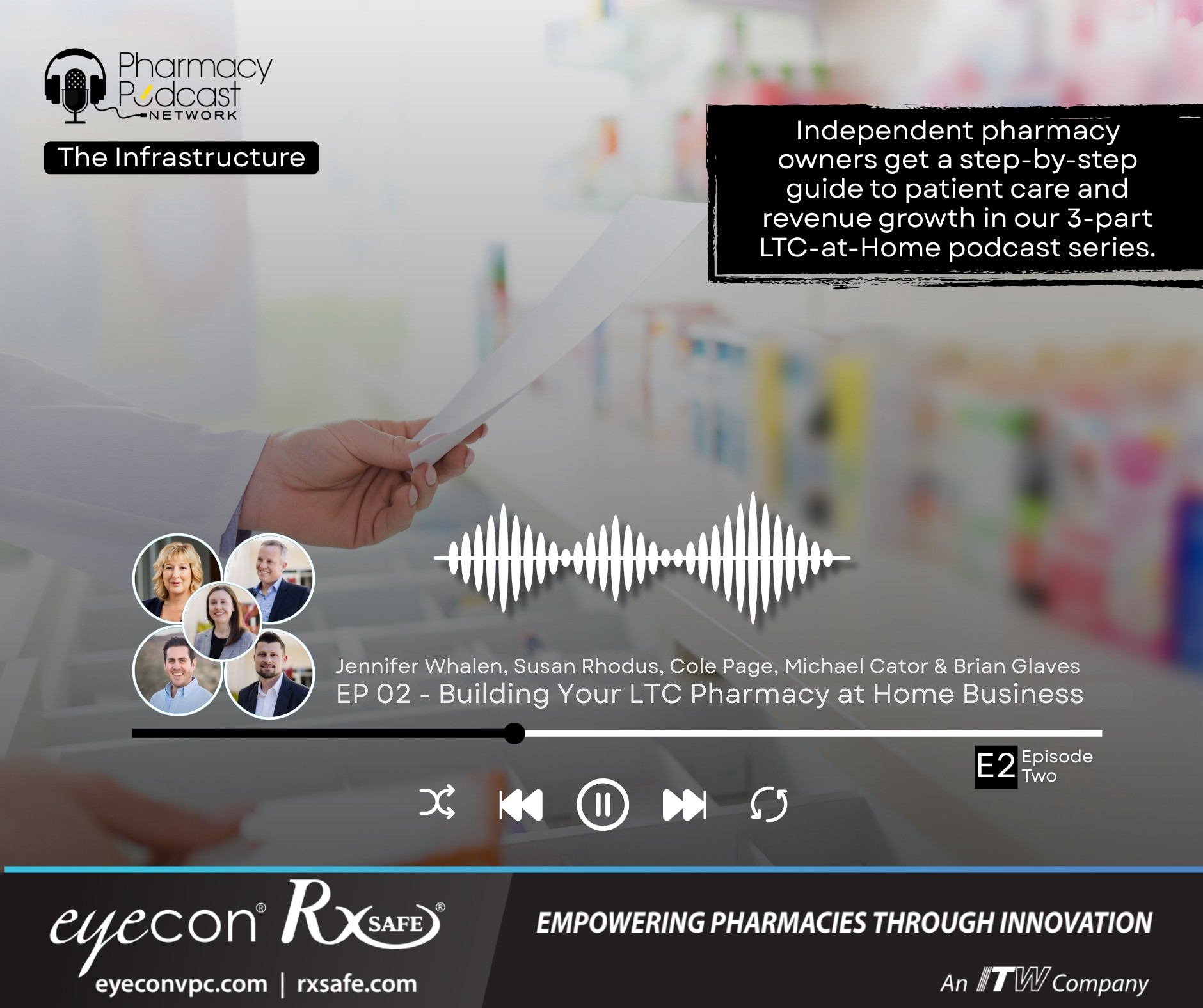Want to discover how to grow your independent pharmacy business – and profitability – with adherence packaging? At the PDS Super-Conference, we assembled five of your fellow pharmacy owners – with a collective 37 years of experience in adherence packaging – and asked them to share what they have learned.
Forget “ivory tower academic” theories: these pharmacists have tried all manner of adherence modalities before arriving at what works in the real world. And in this blog, they’re going to give you their hard-won advice and insight.
If you prefer, you can also watch the video below, which encapsulates the best questions and answers at RxSafe’s adherence breakfast session, over both days.
Here are the pharmacy owners featured at the breakfast session:
- Amjad Abukwaik, PharmD, Sheefa Pharmacy in Paterson, NJ.
- Bruce Kocian, PharmD, Gibson Pharmacy in Athens TX.
- Kyle Lomax, PharmD, Southern Pharmacy in Jonesboro, AR.
- Ben McNabb, PharmD, Love Oak Pharmacy in Eastland, TX.
- Independent Pharmacist in Anaheim, CA.
The panel discussion was moderated by Todd Eury, publisher and CEO of the Pharmacy Podcast Network.
Question 1: Experience with adherence systems and automation
Q. [Todd Eury] Have you had experience with strip packaging and adherence packaging before purchasing the RapidPakRx? If so, discuss that experience and tell us about what you've done and how you've managed it.
A. [Bruce Kocian] We do have a competing company's automation for strip packaging. Before the strip packaging, you name it, we've probably done it: Medicine on Time, Doc-u-Dose, OPUS, cassettes. The experience as far as the automation goes… not a good one. Not a fairy tale. With the previous machine, we had varied time as far as the pharmacist goes. A lot of time constraints on the pharmacists themselves. If you have the systems that require 200- 300 canisters to load into the automation, you've got the pharmacist checking the loaded canisters, you've got the pharmacist checking lighted trays or a tray system for their pack. Then again, you've got the pharmacist checking the strip system. So if you've got a system that requires not only your tech time but also that much time from your pharmacist, you can see that kind of snowballs. We actually put a hold on our adherence packaging system until the RapidPakRx came out. I will tell you that the look on my tech's face now, when we say we have a new customer that's going to the packaging, as opposed to what it was before, is completely different. It's almost like a little emoji. A little sad, frowny one. Now it's a nice big smiley face with dimples. I would want everybody to really do your due diligence on the automation as well as the company that you're going to be in business with, when you step down this path.
A. [Amjad Abukwaik] Well, we've been doing packaging for almost seven years. I had a competing system before and unfortunately it was not effective. Truth is, I did not have a good experience with it. The difference between RapidPakRx and the other competitors, they do have 200 cells or canisters, that unfortunately you have to calibrate every time you add the new NDC. You know how it is now, especially with generics, you get a different shape, different color and if you change the NDC because of a different price, and so on, you're out of luck with that canister. So, even though I had one with more than 200 canisters, I did every single one manually, so I never used those canisters, unfortunately. It was time consuming, it would take an hour-plus per patient, to do like 10-12 scripts per patient. And the verification process was a nightmare, you actually had to go through each and every single pouch, look at it, and you hope that you did the right thing. You hope that you actually checked it, and looked at it, and verified it.
Question 2: Does this type of compliance packaging work on really tough, non-adherent patients?
Q. [PDS Audience Member] With the non-adherents that we all have that just refuse to be adherent, have you had much luck putting those patients in the program and then just accepting it? Because those are the ones that, even if you're in a sync program, they won't pick up.A. [Ben McNabb] That's what I've found tremendously [to improve adherence]. Even with sync, some of these patients, they just will not take the medications appropriately or there's anecdotal issues with the physician telling them only take a half or whatever these issues are. When you're reconciling the meds every single month, once a month, you're forcing them to take it according to how the package is listed. If they miss a dose, they potentially put it to the side, and they continue trying to remain adherent on the dates and times. So they might have a little bit extra here, but the system is trying to keep them adherent. Over the long run, it trains them. But also, I think they might have a little waste at home, but it's going to keep your scores moving forward the way it needs to go.
Question 3: What about workflow? Can I fill for multiple locations?
Q. [Todd Eury] I want to talk about work flow for a second, Kyle. And that is serving vial patients, adherence packaging patients, and the workflow that goes into that, especially with your multi-locations.A. [Kyle Lomax] One of the requirements that we were looking at in a packing solution was the ability to fit it into our existing workflow. Obviously, with the size of our pharmacy we didn't have a lot of options in that area. So, we just used our dispensing system to designate, first of all, that the patient is in our packing system. And then second of all, we use another grouping inside of that to basically distinguish between delivery zones.
A. [Kyle Lomax] So, for our multiple locations, if we're servicing a patient that happens to be associated with one of our other locations, we use that grouping throughout the work flow to identify where it needs to be delivered. And also, when it gets to the print queue it's sent to a different workflow than our vial fill. So, we've seen good success with using that system to basically service multiple locations, without having to have a system in each location.
Question 4: Discuss how you market your adherence services.
Q. [Todd Eury] I want to ask Ben, based on his use of social media, how are you marketing this technology to your customer base? Because we can invest in all the technology we want, it will increase efficiency, it's going to help you save money with tech time and pharmacy time, you're going to be able to spend more time with your patient, but if you're not telling the story of the investment you made -- which by the way, is extremely interesting to people out there wanting to know what's your pharmacy doing that -- "Hey, I heard about Amazon and this PillPack. So what are you doing?"A. [Ben McNabb] I've been really impressed with the impact of social media. Especially, if you can get this social media presence out there as personalized as possible, you already have a well-built advantage. You can really get that message out there, and it's not just for the 85-year-old that might not be on Facebook, it's about caregivers and children that are taking care of them at home. So, your audience is very broad in your marketing for this. Considering everyone that is involved in the care of that patient, whether it's caregivers, providers, or the patients themselves, and many, many more seniors are on Facebook. I know my 85-year-old grandmother-in-law is on Facebook now.
A. [Ben McNabb] I mean, just imagine some of the potential there. I would just say that, make sure you have a little plan. Make sure you're doing your research on effective social media advertising. Facebook typically doesn't like the mass-produced or stock-image type of advertisement. It really wants it to come down to that local level. It wants it to come down to that relationship that exists between you and the customer, that's a sincere relationship. So, if you can get that across, Facebook's algorithms could really pick that up, see that it's engaging content, and you can boost the heck out of it in your geographic area and really make a good go at it.
Question 5: Partnering with other providers
Q. [Todd Eury] How do you partner with other health providers?A. [Amjad Abukwaik] Partner with your health plan, you have a lot of Medicare Part D plans, you know, reps, and they knock on your door, they knock on my pharmacy door all the time, and "Can we talk to your patient about switching your patient from plan A to plan B," and so on. Find a good one that is beneficial for you. They will be your best friend, they will bring you tons of patients.
A. [Independent Pharmacist] In regards to that, we're in a medical building, and next door, what they did was they had all the brokers come in. And whenever I talk to brokers, I'm like, "Okay, so you're a broker, there's other brokers just like you. So, in order to differentiate yourself, why don't you work with a pharmacy that has a packaging system?” So, it's a win-win for you because you get the extra value that the other brokers can't bring in. So, a good target market too is talking to brokers, as Amjad said.
A. [Bruce Kocian] Let me just add real quick, there’s another venue: hospital readmissions. You know, go there, if you have a hospital close to you locally, their readmission rate greatly affects the reimbursement with Medicare now. So, that's another avenue for you. And then speaking to some of the advertising, we actually have a nurse in the county that works for one of the insurance companies that refers patients to her. She's not a home health nurse, she doesn't work for the local home health agency, she works for one of the insurance companies. And she calls us on a regular basis with her high-med, difficult patients, they put them in our packaging system.
A. [Ben McNabb] Make sure you get a couple home health agencies on your side as well. Home health, they love this. If you can get a good home health agency, you will just get tons of referrals. They're referring these patients to take 10 or more medications. Maybe they can only keep on service for so many months, they get a long-term solution to managing medications, or you get a great fit for those home health agencies. They're out in the community also, so their geographic area, at least in my area, rural area, it's pretty extensive.
To learn more about the RapidPakRx, visit our product page or schedule a demo with your salesperson. To speak with an automation expert right away, call now at (877) 797-2332.


.png)





